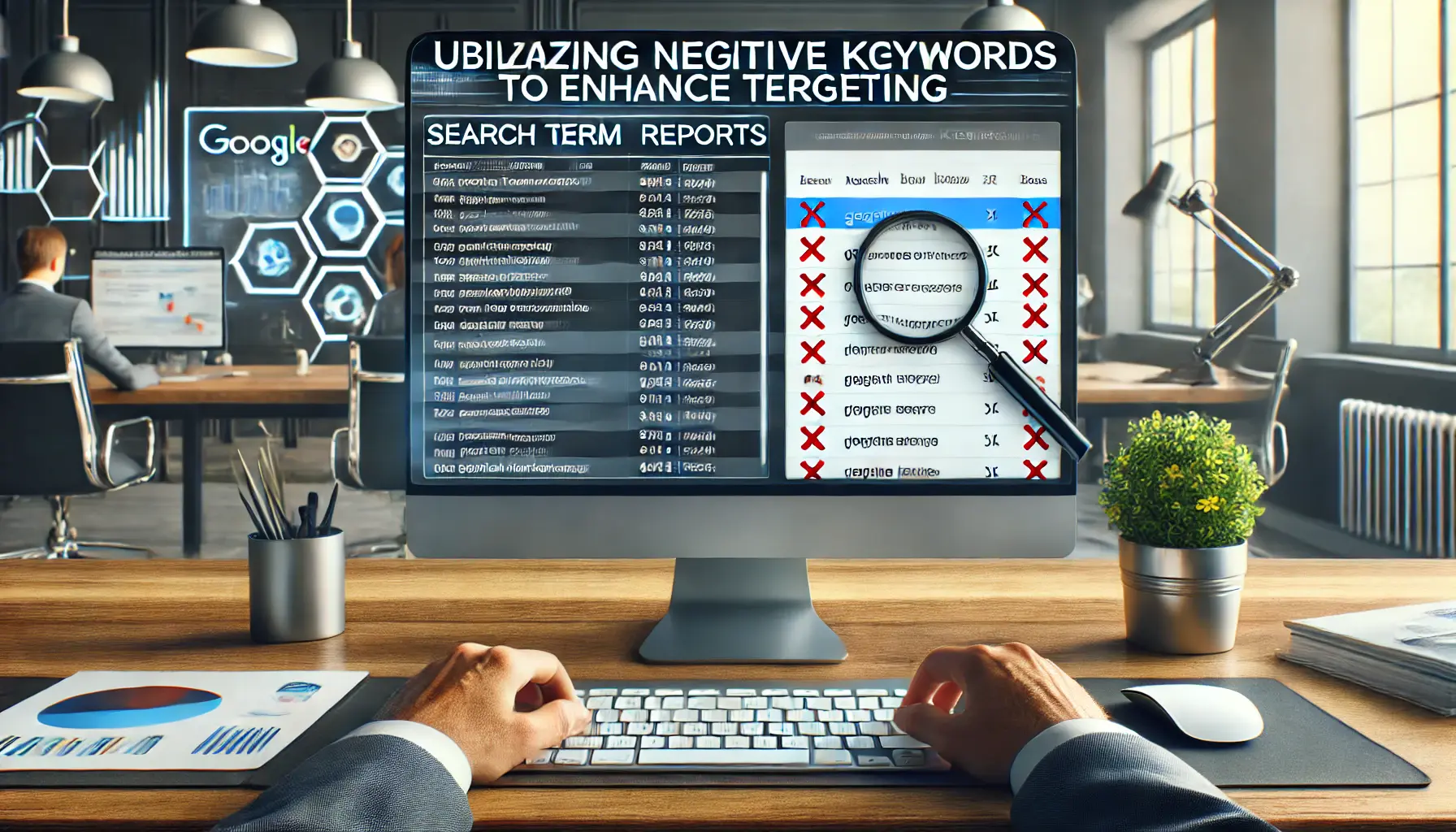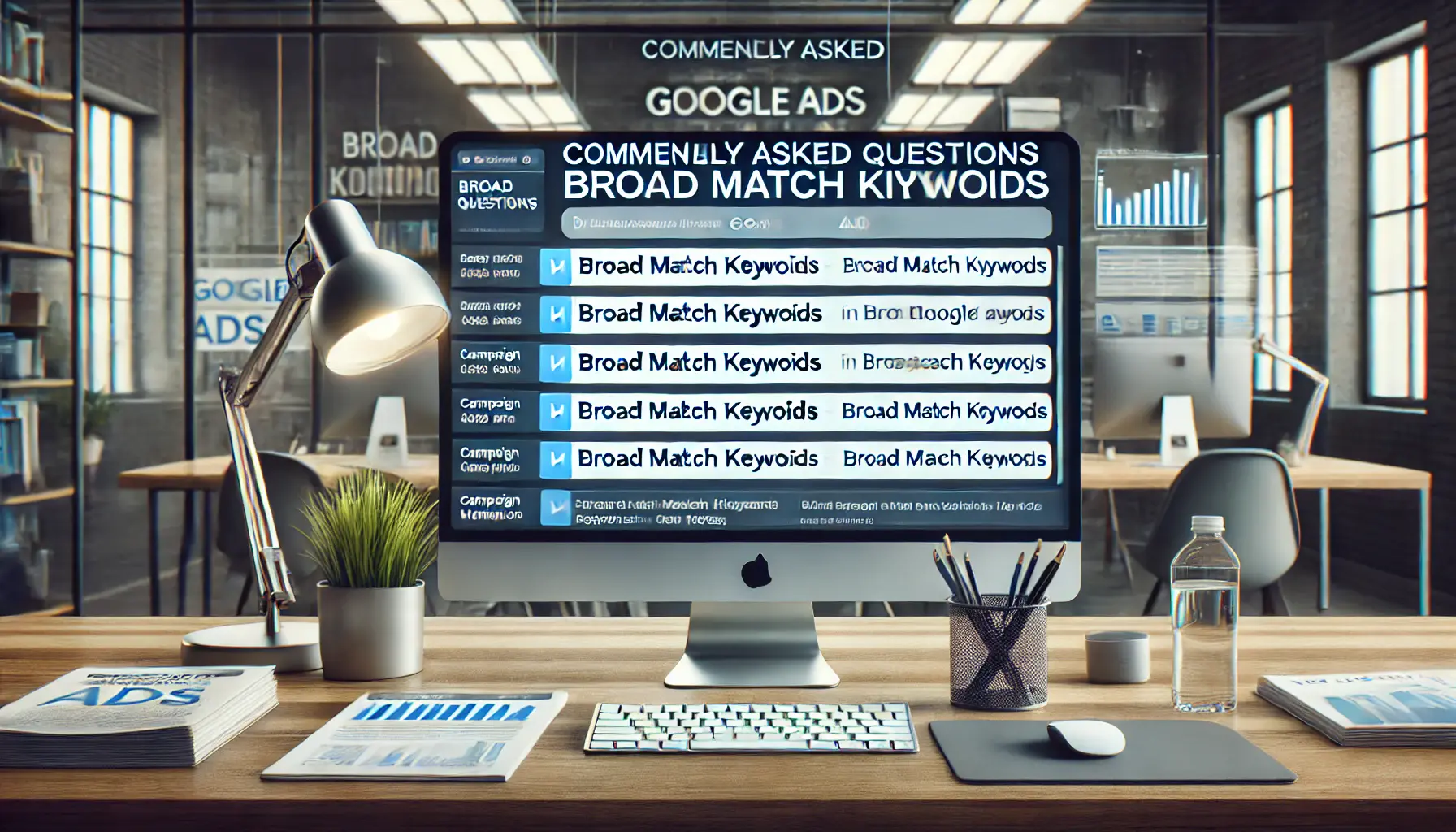Like the digital advertising world, the changes are very fast-moving.
Going into 2025, fully understanding and knowing how to take advantage of broad match keywords in Google Ads can make or break your campaign’s ability to reach its full performance potential.
Let’s delve into what broad match keywords are and how they have evolved to become a pivotal component of your advertising strategy.
- Understanding Broad Match Keywords in 2025
- Implementing Broad Match Keywords in Your Campaigns
- Maximizing Performance with Broad Match Keywords
- Advanced Strategies for Broad Match Keywords in 2025
- Common Challenges with Broad Match Keywords and How to Overcome Them
- Conclusion: Mastering Broad Match Keywords for Google Ads Success
- Commonly Asked Questions About Broad Match Keywords
Understanding Broad Match Keywords in 2025
Broad match keywords are designed to cast a wide net, allowing your ads to appear for searches that are related to your keyword, including synonyms, related searches, and even misspellings.
This match type offers the widest reach among all keyword match types, enabling you to connect with a broader audience.

The Evolution of Broad Match Keywords in Digital Advertising.
Definition and Evolution of Broad Match Keywords
Traditionally, broad match keywords enabled your ads to show up for searches that included any word in your key phrase, in any order, and along with other terms.
However, in 2025, Google’s advanced machine learningA type of artificial intelligence that allows systems to learn and improve from experience without explicit programming. algorithms have refined this feature.
Now, broad match considers the overall meaning and intent behind a user’s search query, not just the individual words.
This evolution means your ads are more likely to appear for searches that align with the services or products you offer, even if the search terms don’t exactly match your specified keywords.

Illustrative Comparison of Keyword Match Types in Google Ads.
Differences Between Broad, Phrase, and Exact Match Types
It’s essential to distinguish between the three primary keyword match types to effectively strategize your campaigns:
- Broad Match: As discussed, this match type allows your ads to appear for searches related to your keywords, including synonyms and related concepts. For instance, if your keyword is ‘running shoes for women,’ your ad may show for searches like ‘female athletic footwear’ or ‘sports shoes for women.’
- Phrase Match: Your ads show for searches that include the meaning of your keyword phrase, allowing for extra words before or after. For instance, ‘buy women’s running shoes online’ or ‘best women’s running shoes 2025’ would trigger your ad if your phrase match keyword is ‘women’s running shoes.’
- Exact Match: Ads appear for searches that have the same meaning or intent as your keyword. This match type offers the most control but limits reach. For example, the exact match keyword [women’s running shoes] would trigger ads for searches like ‘women’s running shoes’ or ‘running shoes for women.’

Contrasting Pros and Cons of Using Broad Match Keywords in Google Ads.
Pros and Cons of Broad Match Usage
Using broad match keywords comes with advantages and disadvantages:
- Pros:
- Reach More Users: Broad match allows your ads to reach a wider audience by matching to a variety of related search queries.
- Find New Keywords: It helps in discovering new search terms and trends that you may not have considered, offering precious insights for keyword expansion.
- More Flexibility: Due to the constant and dynamic improvements of Google’s algorithms, broad match is able to interpret user intent and make your ad relevant for a larger set of queries.
- Cons:
- Risk of Getting Irrelevant Clicks: The very expansive character of broad match can make your ads show up for unrelated searches, which may be a total waste of your ad money.
- Conversion Rates May Be Lower: Since this is a very broad targeting, some clicks will definitely come from people who do not look exactly for what your product or service is offering. Therefore, conversion rates may be lower too.
- Requiring Constant Monitoring: To keep this ad type efficient, broad match campaigns need periodical analysis and optimization. You need to add negative keywords continuously in order to filter traffic that is irrelevant.
Below, we are going to explain the successful application of broad match keywords in your campaigns to ensure the maximization of their power.
Broad match keywords in 2025 focus on user intent, offering advertisers unparalleled reach by leveraging Google’s advanced algorithms.

Implementing Broad Match Keywords in Google Ads Campaigns.
Implementing Broad Match Keywords in Your Campaigns
Effectively incorporating broad match keywords into your Google Ads campaigns can significantly enhance your reach and performance.
Here’s how you can implement them strategically:

Setting Up Broad Match Keywords in Google Ads Campaigns.
Setting Up Broad Match Keywords in Google Ads
To begin utilizing broad match keywords:
- Access Your Google Ads Account: Log in to your account and navigate to the campaign where you want to add broad match keywords.
- Choose the Ad Group: Choose an ad group within which the keyword is to be included.
- Add Keywords without Modifiers: Enter your keywords here, without quotation marks or brackets; by default, they will be matched against broad searches.
- Save Changes: Save the new settings.
Following these steps, your ads will become eligible to appear for thousands of search queries related to your broad match keywords.

Combining Broad Match Keywords with Smart Bidding in Google Ads.
Combining Broad Match with Smart Bidding Strategies
Integrating broad match keywords with Smart Bidding can optimize your campaign performance.
Smart Bidding uses machine learning to adjust bids in real-time, maximizing results based on your goals.
To implement this combination:
- Enable Smart Bidding: In your campaign settings, select a Smart Bidding strategy such as Target CPA (Cost Per Acquisition) or Target ROAS (Return on Ad Spend).
- Monitor Performance: Regularly review your campaign metrics to assess the effectiveness of the broad match and Smart Bidding combination.
- Adjust as Needed: Based on performance data, refine your keywords and bidding strategies to enhance results.
This approach allows Google’s algorithms to leverage broad match’s extensive reach while ensuring bids are optimized for conversions.

Using Negative Keywords to Improve Targeting in Google Ads Campaigns.
Utilizing Negative Keywords to Enhance Targeting
While broad match keywords extend the reach of your ad, they can sometimes trigger impressions for unrelated searches.
Negative keywords are important to hone in on that targeting and exclude certain terms irrelevant to your offer.
To apply negative keywords:
- Identify Irrelevant Search Terms: Go through your Search Terms Report to identify queries that are not related or relevant to your business.
- Add Negative Keywords: From within your campaign settings, locate the option to add negative keywords and include these terms there.
- Regularly Update Your List: Continuously review search queries and refine your list of negative keywords to keep your ads relevant.
Effective negative keyword management enables you to avoid serving irrelevant audiences your ads, yielding improved click-through rates and reserving your budget for a more targeted audience.
Strategic implementation of broad match keywords with Smart Bidding and negative keywords can help make your Google Ads campaigns broader yet more relevant and cost-effective.
Strategic implementation of broad match keywords with Smart Bidding ensures optimal campaign performance and efficiency.

Maximizing Performance in Google Ads with Broad Match Keywords.
Maximizing Performance with Broad Match Keywords
Leveraging broad match keywords in your Google Ads campaigns can significantly enhance your advertising performance.
By effectively analyzing search term reports, adjusting bids and budgets, and learning from successful case studies, you can optimize your campaigns for better results.

Analyzing Search Term Reports to Optimize Google Ads Campaigns.
Analyzing Search Term Reports for Optimization
It is important to run your search term reports on a regular basis to understand user behavior with your ads.
The analysis will help you understand which queries trigger your ad and their relevance to your offering.
You are able to:
- Identify High-Performing Queries: Identify those search terms that result in conversions and allocate more budget towards them.
- Identify Irrelevant Searches: Recognize unrelated searches and add them as negative keywords to avoid wastage.
- Unlock New Opportunities: Discover emerging trends or keywords that you may not have thought of and use them to grow your keyword list strategically.
By continually reviewing and refining the search term reports, your broad match keyword approach can be further honed toward user intent to improve ad relevance and performance.

Adjusting Bids and Budgets for Optimized Broad Match Campaigns.
Adjusting Bids and Budgets for Broad Match Campaigns
Optimizing bids and budgets is essential when working with broad match keywords.
Given their expansive reach, it’s important to manage your spending effectively to maximize return on investment.
Consider the following strategies:
- Implement Bid Adjustments: Increase bids for high-performing keywords and reduce them for underperforming ones to allocate resources efficiently.
- Set Budget Limits: Establish daily budgets aligned with your larger marketing objectives to control costs and prevent overspending.
- Employ Automated Bidding Strategies: Leverage Google’s Smart Bidding options, such as Target CPA or Target ROAS, to automatically adjust bids in line with performance data.
By being diligent with bid and budget management, you can ensure that your broad match campaigns are cost-effective and aligned with your business objectives.

Successful Case Studies of Broad Match Keyword Implementations in Google Ads.
Case Studies of Successful Broad Match Implementations
Examining real-world examples can provide valuable insights into the effective use of broad match keywords.
For instance, Citroën, a French automobile brand, implemented broad match with brand inclusions and achieved a 50% increase in conversions at a 35% lower cost per lead.
This success was attributed to driving more qualified traffic with a better conversion rate.
Other advertisers have reported significant gains in campaign performance by coupling broad match keywords with Smart Bidding strategies, allowing Google’s algorithms to optimize for relevant searches and user intent.
These case studies show how broad match keywords can be key players in uplifting campaign performance and driving marketing objectives when used thoughtfully.
To realize the fullest potential of broad match keywords, diligent analysis, strategic management of bids and budgets, and learning from successful implementations are essential.
Follow these best practices, and you’ll unlock the full value of broad match keywords in your Google Ads campaigns.
Regularly analyzing search term reports and adjusting budgets are critical for maximizing the potential of broad match keywords.

Utilizing Advanced Strategies for Broad Match Keywords in 2025.
Advanced Strategies for Broad Match Keywords in 2025
As we navigate 2025, the landscape of Google Ads continues to evolve, offering new opportunities to enhance your campaigns through advanced strategies for broad match keywords.
By embracing automation, integrating first-party dataData collected directly by a business from its customers, such as email addresses or purchase history., and optimizing for conversational search, you can stay ahead in the competitive digital advertising arena.

Using Automation and AI to Optimize Broad Match Campaigns.
Leveraging Automation and AI in Broad Match Campaigns
Google has continuously enhanced its artificial intelligence and machine learning algorithms, making broad match keywords much more effective.
In this context:
- Utilize Smart Bidding Strategies: Leverage automated bidding strategies, such as Target CPA or Target ROAS, that let AI optimize bids in real-time and result in better campaign performance.
- Adopt Responsive Search Ads (RSAs): Create RSAs that enable Google’s algorithms to test multiple headlines and descriptions, identifying the most effective combinations to improve ad relevance and engagement.
- Monitor Performance Metrics: Regularly review campaign data to assess the impact of AI-driven optimizations, making adjustments as necessary to align with your marketing objectives.
By integrating automation and AI into your broad match campaigns, you can achieve more efficient and effective advertising outcomes.

Integrating First-Party Data for Enhanced Targeting in Google Ads.
Integrating First-Party Data for Enhanced Targeting
In an era where data privacy is paramount, leveraging first-party data has become essential for precise targeting.
To enhance your broad match keyword strategy:
- Leverage Customer Match: Upload your customer data to create tailored audiences, enabling personalized ad experiences for existing customers and similar prospects.
- Create Custom Audiences: Build audiences based on active user behaviors, interests, and demographics derived from your data to increase relevance and drive more engagement in ads.
- Ensure Data Compliance: Comply with data privacy regulations by obtaining user consent and ensuring transparency in data collection.
Integrating first-party data enables more accurate targeting, fostering stronger connections with your audience and improving campaign performance.

Optimizing for Conversational Search and Natural Language Queries in Digital Marketing.
Optimizing for Conversational Search and Natural Language Queries
The rise of voice search and AI-driven assistants has led to an increase in conversational and natural language queriesSearch queries phrased in conversational or everyday language, often used in voice searches..
To adapt your broad match keyword strategy:
- Incorporate Long-Tail Keywords: Identify and include longer, conversational phrases that reflect how users naturally speak and ask questions.
- Align Ad Copy with User Intent: Compose ad copy that directly solves a specific need or answers explicit questions implied by conversational queries, enhancing relevance.
- Optimize Landing Pages: Ensure the content on your landing pages explicitly answers user queries, improving user experience and increasing conversion rates.
By optimizing for conversational search, you can better meet user expectations and improve the efficiency of your broad match keyword campaigns.
By implementing these sophisticated strategies in 2025, you will unlock the full power of broad match keywords and make your Google Ads campaigns innovative and effective in reaching your target audience.
Incorporating automation, first-party data, and conversational search optimization ensures you stay ahead in the evolving ad landscape.

Overcoming Common Challenges with Broad Match Keywords in Google Ads.
Common Challenges with Broad Match Keywords and How to Overcome Them
While broad match keywords can significantly expand your reach in Google Ads, they often present challenges that can impact campaign performance.
Understanding these issues and implementing effective solutions is crucial for optimizing your advertising efforts.

Challenge of Increased Spend on Irrelevant Clicks in Google Ads.
Challenge: Increased Spend on Irrelevant Clicks
Broad match keywords may cause your ads to appear for search queries that are only loosely related to your offerings, leading to clicks from users who aren’t part of your target audience.
This can result in wasted ad spend and lower return on investment.

Implementing Negative Keywords to Improve Google Ads Targeting.
Solution: Implement Negative Keywords
To mitigate this issue, regularly review your search term reports to identify irrelevant queries triggering your ads.
Add these terms as negative keywords to prevent your ads from showing for unrelated searches.
This practice refines your targeting and ensures your budget is spent more efficiently.

Challenge of Lower Conversion Rates in Google Ads Campaigns.
Challenge: Lower Conversion Rates
The broad nature of these keywords can attract a wide audience, including users who may not be ready to convert, thereby reducing your overall conversion rates.

Combining Broad Match Keywords with Smart Bidding for Optimized Google Ads Campaigns.
Solution: Combine Broad Match with Smart Bidding
Integrate broad match keywords with Smart Bidding strategies, such as Target CPAA Smart Bidding strategy in Google Ads designed to achieve as many conversions as possible at a specified cost per acquisition. or Target ROASA Smart Bidding strategy in Google Ads that focuses on maximizing return on ad spend..
Google’s AI will adjust bids in real-time, focusing on searches more likely to convert, thus enhancing your campaign’s efficiency and effectiveness.

Combining Broad Match Keywords with Smart Bidding for Optimized Google Ads Campaigns.
Challenge: Difficulty in Controlling Ad Placements
With broad match, your ads might appear for a wide array of search queries, making it challenging to control where and when your ads are displayed.

Using Phrase and Exact Match Keywords for Precise Google Ads Targeting.
Solution: Use Phrase and Exact Match Keywords
Incorporate phrase and exact match keywords alongside broad match in your campaigns.
This approach allows you to maintain control over ad placements for specific queries while still benefiting from the expansive reach of broad match keywords.

Managing Evolving Search Behaviors in Google Ads.
Challenge: Managing Evolving Search Behaviors
As user search behaviors evolve, especially with the rise of conversational and natural language queries, ensuring your broad match keywords remain effective can be challenging.

Optimizing for Conversational Search in Google Ads Campaigns.
Solution: Optimize for Conversational Search
Adapt your keywords by including long-tail and conversational phrases that resemble natural queries.
Additionally, craft ad copies and landing pages to address these queries directly, enhancing relevance and user convenience.
By proactively addressing these challenges with the corresponding solutions, you’ll be able to tap into the full power of broad match keywords and ensure your Google Ads campaigns are comprehensive in their reach and efficient at reaching your target audience.
Irrelevant clicks and lower conversion rates are common issues with broad match keywords. Address them by refining negative keywords and utilizing Smart Bidding.

Mastering Broad Match Keywords for Google Ads Success.
Conclusion: Mastering Broad Match Keywords for Google Ads Success
Broad match keywords offer immense potential for expanding your reach in Google Ads campaigns.
By implementing them strategically and addressing their inherent challenges, you can transform your campaigns into powerful tools for achieving your marketing goals.
This article explored various aspects of broad match keywords, providing actionable insights and advanced strategies to ensure success in 2025.

Key Takeaways from Optimizing Google Ads Campaigns.
Key Takeaways
- Fundamentals: Broad match keywords capture searches related to your keywords, including synonyms and misspellings, significantly widening your reach.
- Considered Execution: Effective implementation involves using Smart Bidding, negative keywords, and first-party data to enhance targeting and maximize the value of your ad spend.
- Employ Advanced Strategies: Leverage automation, AI, and conversational search techniques to stay competitive in today’s ever-changing digital advertising landscape.
- Address Challenges Proactively: Overcome issues like irrelevant clicks, lower conversion rates, and evolving user behaviors by refining your approach and staying data-driven.

The Growing Importance of Broad Match Keywords in 2025.
Why Broad Match Keywords Matter in 2025
In the competitive world of digital advertising, adaptability and innovation are crucial.
Broad match keywords not only help you reach a diverse audience but also uncover emerging trends and opportunities.
When combined with cutting-edge tools and techniques, they empower advertisers to achieve greater relevance and efficiency.

Reflecting on Campaign Performance and Broad Match Keywords Strategies.
Final Thoughts
Mastering broad match keywords requires a balance between creativity and data-driven decision-making.
It’s about understanding their capabilities, recognizing their limitations, and using them to their fullest advantage through advanced strategies.
As you plan your Google Ads campaigns for 2025, let broad match keywords be a cornerstone in driving meaningful results and setting you apart in a crowded marketplace.
Broad match keywords provide vast opportunities but require strategic execution and continuous refinement to achieve success in 2025.

Exploring Common Questions About Broad Match Keywords in Google Ads.
Your campaigns can be managed by an agency specialized in Google Ads, check out our service page.
Commonly Asked Questions About Broad Match Keywords
Google Ads broad match keywords can get a little complicated.
Below, find some common questions answered to better help you make use of them.
With broad match keywords, your ads can show when someone’s search includes close variants, synonyms, and related terms of your keyword.
You’re literally broadening the exposure of your ad.
Broad match triggers ads for related searches, while phrase match shows ads only when the search query includes your exact keyword phrase, possibly with words before or after.
Yes, broad match can lead to your ads appearing for unrelated searches, potentially increasing irrelevant traffic and ad spend if not properly managed.
Implement negative keywords to exclude specific terms that are not relevant to your business, refining your ad targeting and reducing unwanted clicks.
Combining broad match with Smart Bidding strategies can enhance performance, as Google’s AI optimizes bids in real-time to align with your campaign goals.
Regularly reviewing search term reports, ideally weekly, helps identify irrelevant queries and new opportunities, allowing for timely adjustments to your keyword strategy.
Yes, broad match can uncover new search queries and audience segments you might not have considered, aiding in expanding your market reach.
Relying solely on broad match can lead to increased irrelevant traffic and higher costs.
It’s advisable to use a mix of match types for balanced targeting.
To set up broad match keywords, enter your desired keywords without any modifiers; Google Ads defaults to broad match for such entries.












